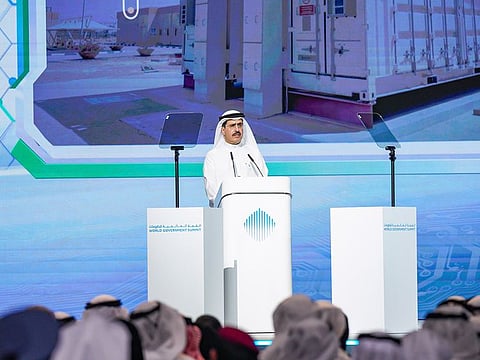DEWA shares pioneering experience in the transition towards clean and renewable energy
At World Government Summit, DEWA spotlights projects diversifying its clean energy sources

Dubai has a clear direction for the energy sector based on the Dubai Clean Energy Strategy 2050 and the Dubai Net Zero Carbon Emissions Strategy 2050 to provide 100 per cent of the energy production capacity from clean energy sources by 2050. Dubai Electricity and Water Authority (DEWA) implements pioneering projects to diversify Dubai’s clean and renewable energy sources to include all available technologies.
During the 8th World Government Summit, Saeed Mohammed Al Tayer, Managing Director and CEO of DEWA, delivered a keynote speech titled Shaping a Green Future. He shared Dubai’s leading experience in supporting the UAE, which has become a role model in the shift to clean and renewable energy.
Vision of the wise leadership
“In line with the vision and directives of the wise leadership of His Highness Shaikh Khalifa Bin Zayed Al Nahyan, President of the UAE; His Highness Shaikh Mohammed Bin Rashid Al Maktoum, Vice-President and Prime Minister of the UAE and Ruler of Dubai; and His Highness Shaikh Mohammed Bin Zayed Al Nahyan, Crown Prince of Abu Dhabi and Deputy Supreme Commander of the UAE Armed Forces, to enhance the green economy in the UAE, last October, the UAE announced its Net Zero by 2050 strategic initiative, becoming the first country in the Middle East and North Africa to launch this strategic initiative," said Al Tayer. "In recognition of its pioneering role in climate action, the UAE has been selected to host the 28th Conference of the Parties (COP 28) in 2023.”
Three pillars
DEWA’s strategy to ensure energy security and sustainability includes three main pillars: The first is to produce more clean energy, especially solar energy. One of DEWA’s major projects to achieve this goal is the Mohammed Bin Rashid Al Maktoum Solar Park, the largest single-site solar park based on the Independent Power Producer model in the world with a production capacity of 5,000 megawatts by 2030. By the end of this year, the share of clean energy capacity in Dubai’s energy mix is expected to reach 13.8 per cent.
The second pillar is to decouple the water desalination process from electricity generation, and desalinate water using Reverse Osmosis technology and solar energy. DEWA aims to produce 100 per cent of the desalinated water by 2030 using a mix of clean energy and waste heat.
The third is disrupting the role of utilities by digitisation using the Fourth Industrial Revolution’s disruptive technologies such as Artificial Intelligence, UAVs, energy storage, blockchain, and the Internet of Things, among others.
Turning challenges into opportunities
The transition to clean and renewable energy is accompanied by several challenges globally. One of the key challenges is renewable energy storage, which can be addressed by developing long-duration energy storage (LDES) technologies. A study by McKenzie in November 2021 estimates that by 2040, LDES deployment could result in the avoidance of 1.5 to 2.3 gigatons of CO2 equivalent per year, or around 10 to 15 per cent of today’s power sector emissions. In the United States alone, LDES could reduce the overall cost of achieving a fully decarbonised power sector by around $35 billion annually by 2040.
In addition to energy storage, big data will play an important role by using sensors in solar power stations to gather real-time data on solar radiation and analyse it in conjunction with data from DEWA’s satellites to improve solar power generation. In this context, DEWA launched its space programme (Space-D) to enhance operational efficiency. In January 2022, it launched DEWA-SAT 1, a 3U nanosatellite. DEWA is the first utility in the world to use nanosatellites in its operations and aims to share its pioneering experiences in this field with other utilities.
Reshaping the concept of utilities
Achieving results is based on innovation which DEWA places as a cornerstone of its work across all divisions. As part of Digital DEWA, the digital arm of DEWA, it is disrupting the entire business of public utilities and contributing to building a new digital future for Dubai. Digital DEWA is based on four pillars: launching advanced solar power technologies; deploying a renewable energy grid with innovative energy storage technologies; expanding integrated AI solutions making Dubai the first city to provide electricity and water services using AI technologies and digital services.
DEWA’s application of the latest innovative technologies has helped it achieve the best results globally compared to top utilities in Europe and the USA. DEWA improved the sustainability of its power and water infrastructure, increasing fuel consumption efficiency up to 90 per cent, and generation efficiency by 37.63 per cent between 2006 and 2021, leading to huge financial savings in addition to an expected reduction of 35.35 per cent in carbon emissions by 2030.
This content comes from Reach by Gulf News, which is the branded content team of GN Media.